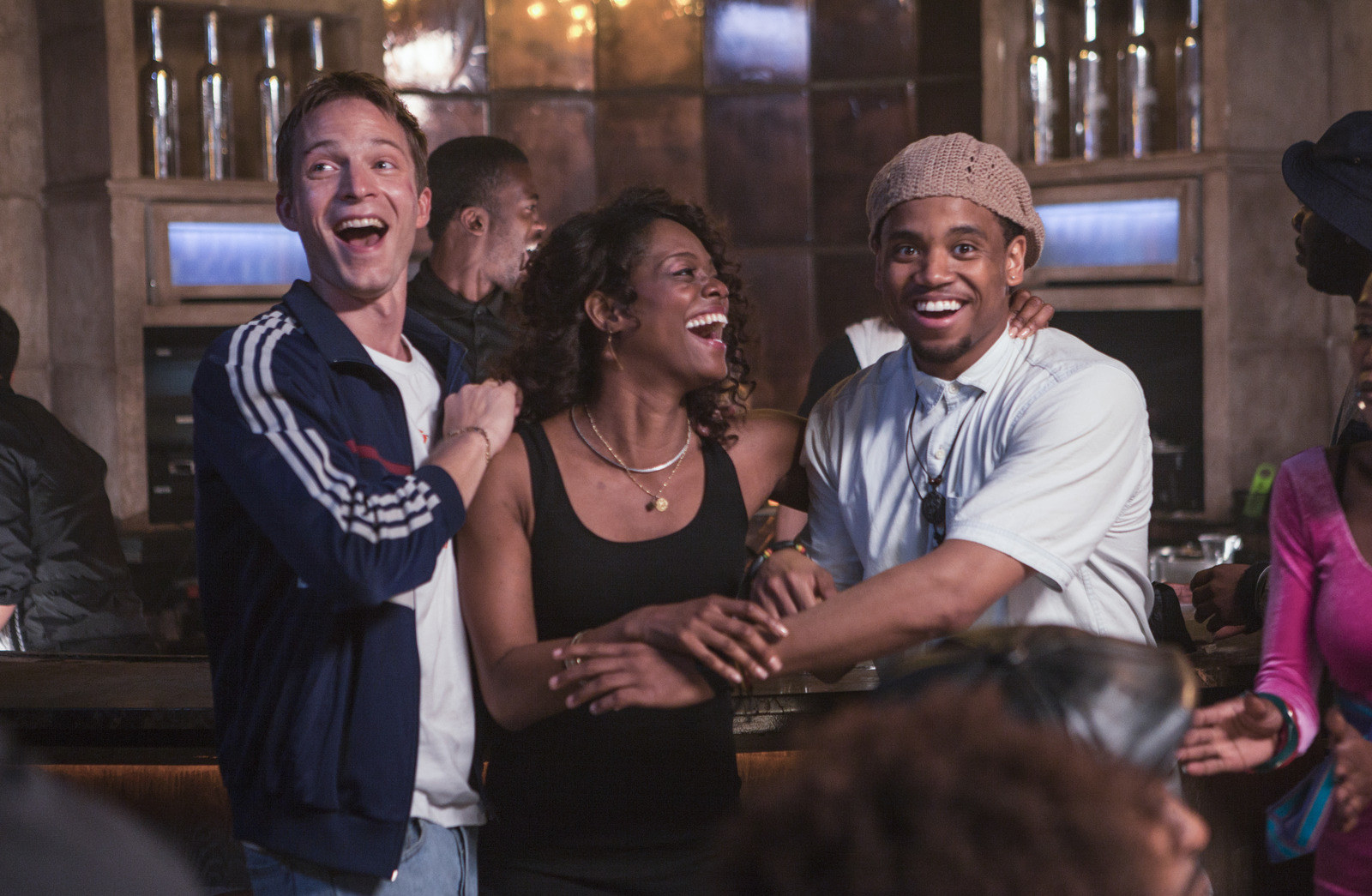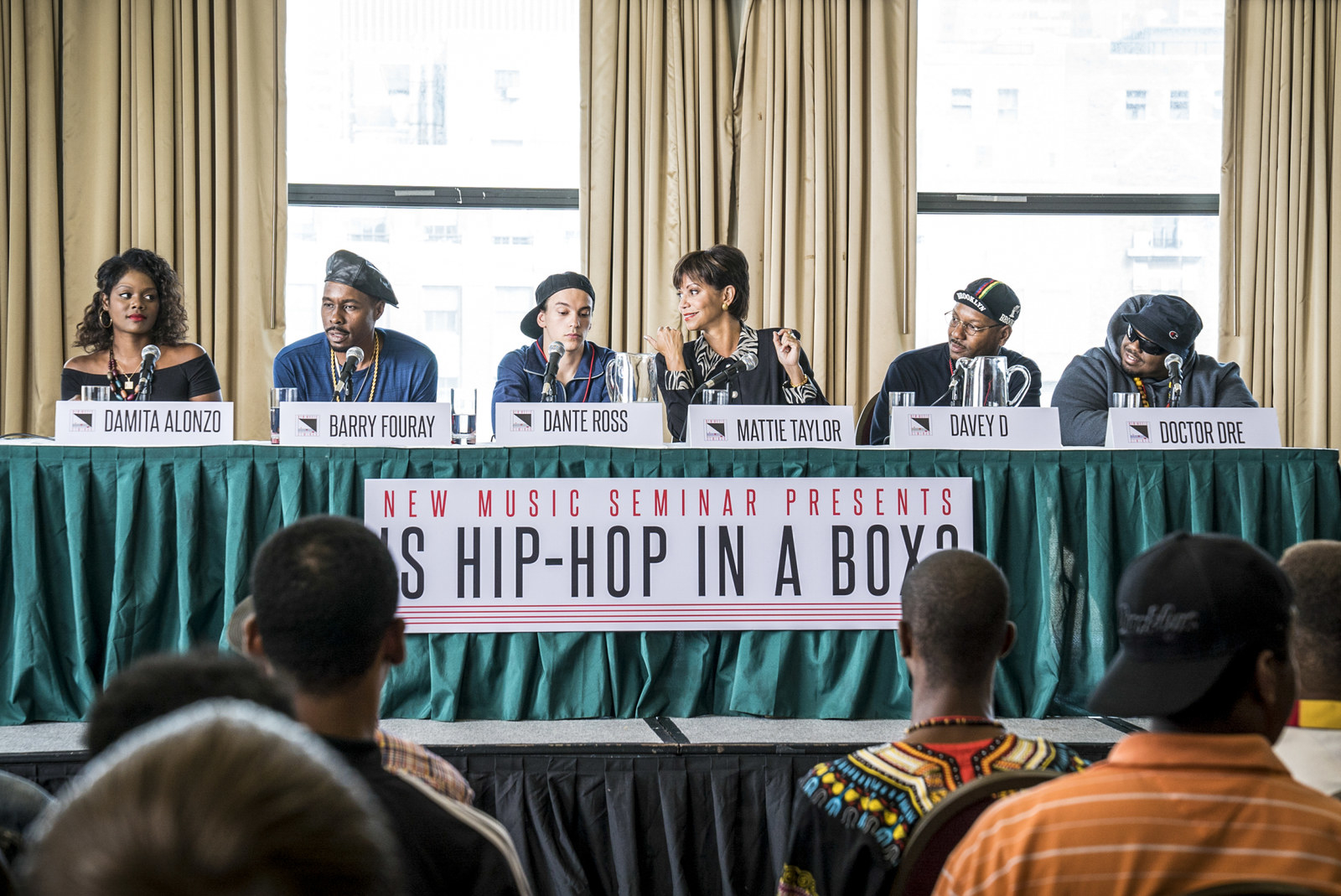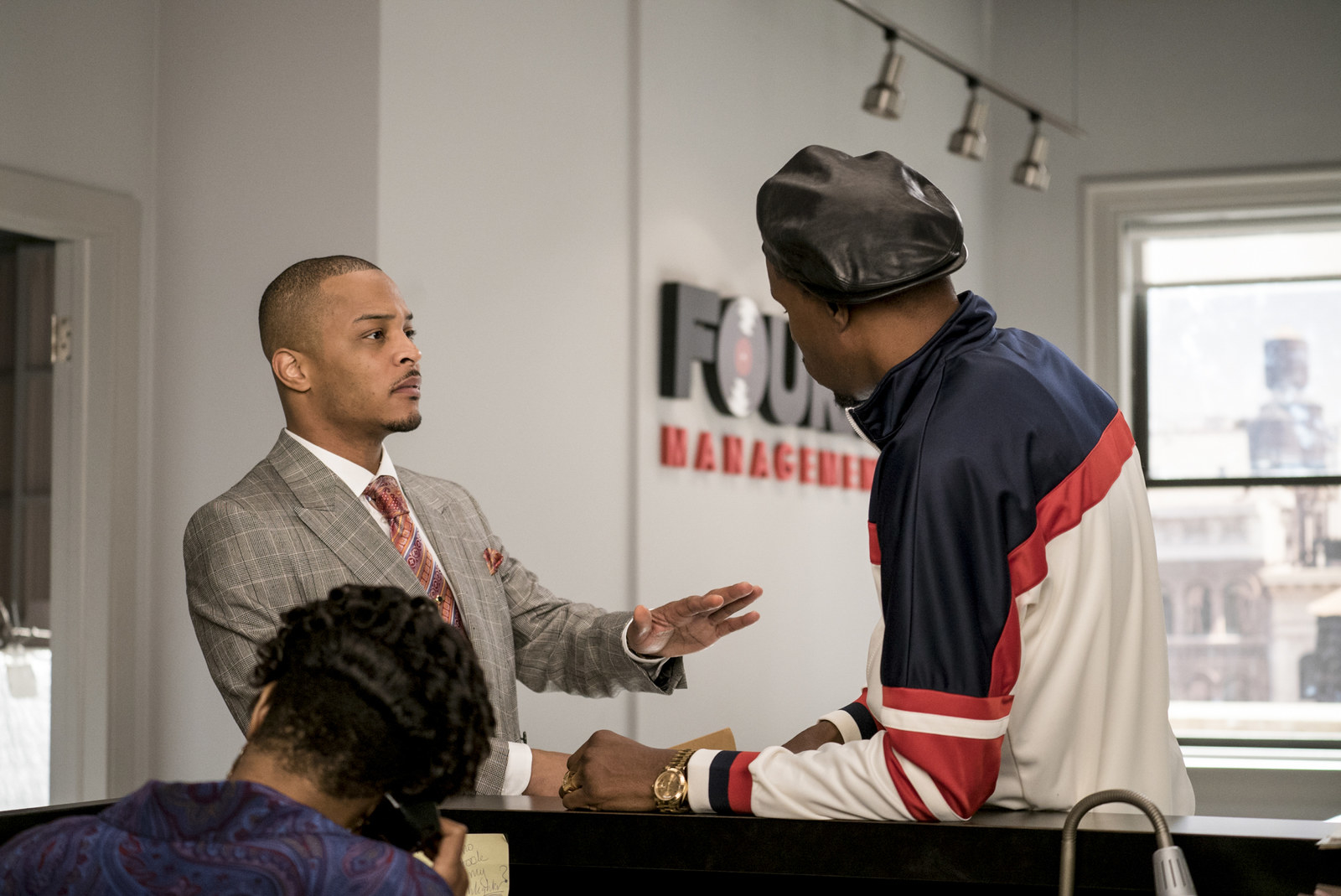
David (David Call), Nikki (Afton Williamson), and DeeVee (Tristan “Mack” Wilds), the central characters in The Breaks. VH1
Any real fan of hip-hop knows that the ‘90s were its golden era. In the early part of the decade, there were multiple MCs and producers lending their ill pens and dope beats to the genre. Legends like Wu-Tang, A Tribe Called Quest, Ice Cube, and Dr. Dre had found their stride. There wasn’t pressure to sugarcoat the sound for the general populations’ tastebuds. It’s an era that is an integral part of rap’s history, and now, VH1’s new series The Breaks is giving us the ‘90s hip-hop drama we deserved more than 25 years ago.
“As a kid who started listening to hip-hop when the Sugarhill Gang came out, and then when Run DMC’s first album dropped … I was a lifer right away. The music spoke to me,” The Breaks showrunner Seith Mann said in a phone interview with BuzzFeed News. “But I didn’t have perspective. And I didn’t understand that you had movements like disco that were very popular for a time, and then faded away. It was only in doing the research for the project that I realized just how long it took the rest of the world to recognize that this music and this art and this culture wasn’t going anywhere.”
Hip-hop began as a way of giving a voice to the voiceless, a platform to the marginalized, a soul to grit — and The Breaks captures it all.
“I really wanted to do a show that was historic. A dramatic show that dealt with how rap had become this dominant sort of world culture.”
The series comes as a direct response to the success of the VH1 original movie bearing the same name — 2.6 million viewers tuned in when the film premiered in January 2016. The movie follows Nikki (Afton Williamson), DeeVee (Tristan “Mack” Wilds), and David (David Call) as they try to break into the budding hip-hop industry in 1990; the series picks up the morning after the rapper behind DeeVee’s new hit track uses him as an alibi in a murder case and a big shot manager hires Nikki as his assistant.
“I really wanted to do a show that was historic,” Mann said. “A dramatic show that dealt with the history of rap, and how rap had become this dominant sort of world culture, knowing that it really wasn’t, and started from a sort of nascent subculture in the South Bronx.”
In researching for the film, Mann came across Dan Charnas’ book The Big Payback: The History of the Business of Hip-Hop, which chronicles hip-hop’s entry into the boardroom in great detail. He was particularly drawn to the events of 1990.
“That was the time where rap had been in the world for awhile, but it had not crossed over into being a definite, permanent sort of music form, a permanent culture, and everything like that,” Mann said. “It was in that golden age that I think it went from being something that could have gone away, not unlike disco, to something that is still alive and well 30, 40 years after its inception.”
Nikki and Barry (Wood Harris) sit on a panel about hip-hop at a “new music” seminar. VH1
It’s easy to forget that there was a period when hip-hop was fighting to get the respect it deserved in the music industry, but The Breaks has been reminding viewers every week, since it premiered on Feb. 20.
There’s DeeVee, whose father actively tries to convince him to stop chasing his dreams of being a rap producer, to the point at which he’s forced to move out or get sent down south to live with his aunt. There’s also Barry (Wood Harris), who heads up a management company (think Russell Simmons meets Diddy), and Nikki, his new assistant, who both have to jump through hoops to try to convince unsigned rappers, like Ahm (Antoine Harris) and Imani X (Teyana Taylor), that they can spin their talent into sustainable careers. And even poor David, who works in radio but got fired from his job in The Breaks feature for daring to play a rap song at his R&B station where his black boss refused to acknowledge hip-hop as a respectable genre.
DJ Premier, an executive producer on the show, lived the history The Breaks depicts; he’s produced tracks for almost every ‘90s hip-hop legend, from The Notorious B.I.G and Nas, to Dr. Dre and Snoop Dogg. He’s also written all of the original tracks that Ahm raps over on The Breaks, most of the score cues, and he’s produced many of the other original rap tracks for the show.
“His insight on the period, and not just the music, but what was going on in the business, what was going on in New York, has been an integral part of our process,” said Mann.
Premier is also one of the producers Wilds’ emulates while playing DeeVee, along with Pete Rock and Q-Tip. “Getting the best things from all of them, how they move, I took something from each one of them and put it together to make DeeVee,” said Wilds in a phone interview with BuzzFeed News.
Wilds, who is also a Grammy-nominated singer, has quite a love affair with ’90s hip-hop. His 2013 Grammy-nominated album New York: A Love Story is filled with songs that pay homage to the sound of that time. He even put a single out in 2015 called “Love in the 90z.” (And let’s not forget his role in the remake of one of the biggest shows of the ’90s — The CW’s 90210.)
“There was something happening, specifically in New York City at the time — the vibes and feelings that were coming out of the city were all unmatched and untouchable,” said Wilds. “I was growing up in New York City watching it; to watch it and see guys who were your heroes growing up to become legends, when they started as kids making the noise they wanted to make, I don’t think there was anything like it. It dictated everything for me. Seeing that let me know that nothing can hold me back from what I wanted to do.”
T.I. as Paul Anders, a big shot lawyer hired to defend the character Barry. VH1
But it took nearly three decades for the stories that composed hip-hop’s rise to become the TV drama they were meant to be. Sure, black Hollywood was also experiencing a golden era of its own in the ’90s, with more black TV shows and lead characters than ever before, but that slowed down drastically by the time Jay Z, Russell Simmons, and Sean “Puffy” Combs had proven that hip-hop culture could lead to multimillion dollar deals.
“It would have been a hard sell in the ’90s,” said Mann.
“There is a certain level of fear and intolerance happening in the world right now that people felt back then.”
“There seems to be a real nostalgia right now for the ’90s,” co-showrunner John J. Strauss added in a phone interview with BuzzFeed News. “There is a certain level of fear and intolerance happening in the world right now that people felt back then. They’re plugging into that similar ‘we want our voices to be heard’ emotion.”
In addition to the similar sociopolitical climate, Wilds sees connections between ’90s hip-hop and today’s music. Kendrick Lamar is giving us crisp, hard-hitting rap bars that paint troubled coming-of-age stories reminiscent of those we used to hear from Ice Cube and Tupac. Chance the Rapper is reminding us that the genre used to survive without the support of a label and it still can again. Drake, whether he lives up to it or not, brings back the anticipation we used to feel waiting for future-legends’ albums to drop. And Remy Ma has revived a subgenre of rap that used to run wild three decades ago: diss tracks. “Hip-hop is the closest to what it was then with the amount of music and the consistency of music we’re getting from all our top artists,” Wilds said. “It’s amazing, it’s a great time. Why not pay homage to the time that brought us where we are today?”
Television is also starting to make its way back to that ’90s golden age for black programming. With shows like HBO’s Insecure, ABC’s Black-ish, and FX’s Atlanta, black twentysomethings can finally see versions of themselves onscreen, whether they’re struggling to balance microaggressions at work and indiscretions in their relationships (Hey, Issa); trying to prove to their parents and baby mama that they’re more than a fuckup (What up, Earn); or trying to stay sane while their morally-corrupt parents battle it out for control of the record label they built (OK, that’s probably no one, but Fox’s Empire is another hip-hop-based show that turned out to be a game changer for its network). The point is there’s a subtle TV revolution happening, giving us accurate portrayals of the daily life of black folks — and The Breaks, albeit set in a different time period, is no exception.
Harris, who plays hip-hop exec Barry on The Breaks, is one of the only leads on the show who has been acting since the ‘90s. “Part of it is Hollywood had to evolve,” Harris said in a phone interview with BuzzFeed News as to why it took 30 years for hip-hop’s early days to make it to TV. “A lot of that comes from people speaking up these past few years, which prompted some diversity and forced Hollywood to examine it. After examining diversity, there’s been a watchful eye as it relates to diversified movies, topics, and people onscreen. So you know, I’m happy to still be acting in this era of television and film.”




